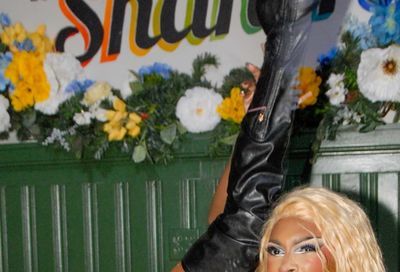Sucker Punch
The Studio kick-starts the new year into high gear with 'Black Milk,' a gritty play centered around two Moscow cons
If you’re planning to produce a bleak, dispiriting tale of bitter realities in post-Soviet Russia that bears the title Black Milk, perhaps you ought to consider presenting it in the warmth of greener, more optimistic climes. But in the dead of their ambitious Russian Winter season, The Studio Theatre kick-starts the new year into high gear with Vassily Sigarev’s gritty sucker-punch of a play centered around two Moscow cons and a routine trip to the countryside to fleece some unsuspecting simplefolk.
There are no lighthearted laughs found in Sigarev’s depiction of life after the collapse of the Soviet Union, no balmy glow from cheerful hearts and open hands. It takes more than a little while to warm up to the English translation by Sasha Dugdale, where Russia is just as stone cold as it ever was, depicted as a frost-bitten landscape of ruthless opportunists and deflated patriots wary of a government that has failed to deliver on promises of a brighter future.
 |
It’s no wonder how easy it is, amid all this uncertainty and disillusionment, that a pair of married urban hustlers are able to waltz into town and scam an impoverished community into paying almost four times the retail value for a “Wonder Toaster, ” a simple toasting oven rendered useless in a rural area so small that bread is never delivered there. When locals mistake the device for a bread-baking machine and realize they’re victims of two lawless swindlers, they seek justice in unusual forms.
Lyovchik and Shura (Matthew Montelongo and Holly Twyford) are the volatile couple waiting at the nearest train station to buy tickets and ditch town with a fat purse. Not only is Shura a loud, brash, cursing, chain-smoking vision in black leather and knee-high boots, she’s also eight months pregnant. And of course she’s caught at this train station, in a provincial village without a hospital or crude health clinic, when her water suddenly breaks. After the revelation of her labor and birthing aid from a local midwife (Elizabeth Stripe), Shura realizes her need for redemption and seeks to be “human ” again. But Sigarev has already established Lyovchik and Shura as a truly loathsome couple, and not only will his cruel profiteers have to accept her nascent spirituality, but Shura must also be willing to pay the price to live out her domestic fantasies. Sigarev poses the question of whether or not true redemption can — and should — exist in such horribly mangled lives.
The volume is turned up a few decibels in Serge Seiden’s roaring production that delivers Sigarev’s explosive dialogue as cannons shot from mammoth barrels. Sound travels well in the intimate Mead space, where Twyford and company lend credence to the stereotype that Russians run around yelling at each other with irrepressible force. And although none of the characters speak to each other in Slavic dialect, Sigarev’s sleek contemporary lexis is a keen marriage of new Russia and callous slang from underground urban life in America.
|
Twyford and Montelongo are exceptional as the corrupt strangers who delight and demolish each other. Twyford’s compelling transformation from hardcore bitch to vulnerable new mother serves as the catalyst for Montelongo’s terrifying performance as her manipulative beast of a husband. The two are so convincing together that it’s easy to believe their entire diet consists of Chupa Chups lollipops and menthols. Stripe is also expertly cast in her affecting, sympathetic portrayal of the doting Auntie Pasha, who explains that since Shura smoked during her pregnancy, her breast milk is bitter; hence the baby — still unnamed ten days after birth — rejects mother’s milk.
Although Seiden makes a few heavy-handed directorial choices, including a surprising (and arguably unnecessary) special effect at the play’s conclusion, Black Milk is an intense, absorbing piece of theater, and Sigarev’s poignant examination of the hope in the human spirit is a devastating, gut-wrenching account that blisters with powerful impact.
Support Metro Weekly’s Journalism
These are challenging times for news organizations. And yet it’s crucial we stay active and provide vital resources and information to both our local readers and the world. So won’t you please take a moment and consider supporting Metro Weekly with a membership? For as little as $5 a month, you can help ensure Metro Weekly magazine and MetroWeekly.com remain free, viable resources as we provide the best, most diverse, culturally-resonant LGBTQ coverage in both the D.C. region and around the world. Memberships come with exclusive perks and discounts, your own personal digital delivery of each week’s magazine (and an archive), access to our Member's Lounge when it launches this fall, and exclusive members-only items like Metro Weekly Membership Mugs and Tote Bags! Check out all our membership levels here and please join us today!





















